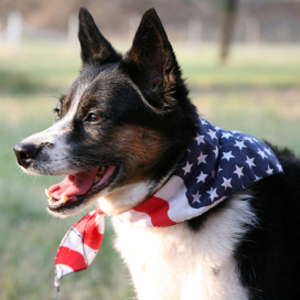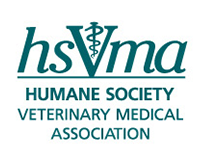Four Tips for Giving Your Pets a Safe July 4th
Make this summer holiday happy and harmless for the animals in your life
 Sherri R Camp Sherri R CampJune 25, 2013
[ En Español ]
The Humane Society of the United States and its veterinary affiliate, the Humane Society Veterinary Medical Association, encourage pet owners to take extra precautions to keep their pets safe this Independence Day and to be aware of two potential hazards: fireworks and heat.
Fireworks
Many pets can become overwhelmed by the noise and commotion associated with parades and fireworks displays. In fact, so many pets become frightened and try to flee the sights and sounds that animal shelters around the nation report a dramatic increase in lost pets during the holiday.
"Our pets are more sensitive to loud noises, flashing lights and strong smells than we are, so Fourth of July festivities can quickly become frightening," said KC Theisen, The HSUS' director of pet care issues. "Provide them with a safe, secure place to stay while you enjoy the holiday."
Heat
Fourth of July festivities can make people forget that on any summer day, heat puts pets in jeopardy. Barry Kellogg, VMD, senior veterinary advisor for the HSVMA, points out "It is very important to remember that a dog doesn’t have to be shut in a car to be at risk of heat stroke. Pet owners need to be aware of this issue before it occurs, as it can turn deadly very quickly." Keep an eye on your pets and act immediately if you see any signs of heatstroke.
Four tips for a safe and happy Fourth of July
Now that you know what the dangers are, follow our tips for giving yourself and your pets a great Independence Day.
Keep all pets safely confined indoors on the 4th and the few days before and after the holiday, when people may be inclined to set off fireworks
There are many family and group activities that are perfect for pets, but a public fireworks display or any other type of gathering where fireworks will be set off usually isn’t one of them. It’s best to leave your pets safely indoors, preferably with a radio or TV turned on to dampen jarring noises. Pets usually kept outdoors should be brought inside as an extra measure of safety. And if you must take your pet with you to an Independence Day event, keep her leashed and under your direct control at all times.
Never leave your pet in a parked car
On a warm day, temperatures inside a vehicle can rise to dangerous levels within minutes. On an 85 degree day, for example, the temperature inside a car even with the windows cracked open can reach 102 degrees within just 10 minutes; after 30 minutes the temperature will reach 120 degrees. Even when the temperature outside is a balmy 72 degrees, the temperature inside your car can rocket to a fatal 116 degrees in less than an hour’s time. Additionally, a dog in a car is an invitation for theft, of the dog, the car, or both. Protect your pet by taking him with you when you leave the car, or leaving him at home if he cannot join your activities.
Consult your veterinarian if your pet is distressed by loud noises such as fireworks displays
Your veterinarian may be able to recommend medications and techniques to help alleviate your pet’s fear and anxiety. The Humane Society of the United States also offers tips for helping your dog cope with loud noises like thunder and fireworks.
Ensure your pet is wearing a collar and identification tag with current contact information so you can be reunited quickly if your pet does escape
All pets, even those kept indoors full-time, should wear collars with identification tags at all times. Indoor-only animals can become so frightened during fireworks displays that they take desperate measures to escape the noise, such as breaking through window or door screens. As an extra precaution, it’s a good idea to have your pet microchipped, with your current contact information registered with the chip company. If your pet does become lost, contact your local animal control and surrounding shelters immediately. If you find a lost pet, either take her to the address on the tag or bring her to the local animal shelter so she can be reunited with her family.
For more pet care resources, visit humanesociety.org/pets.
Media Contact: Raúl Arce-Contreras: 301-721-6440, [email protected]
|

